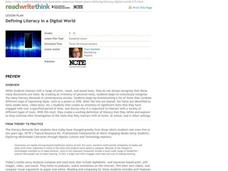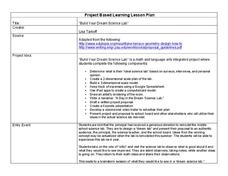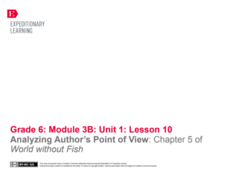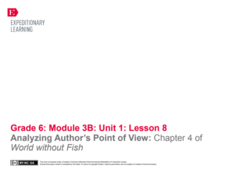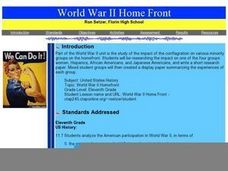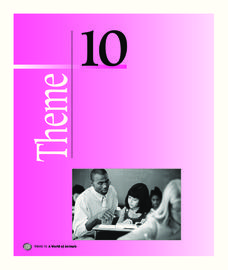Azar Grammar
Song Lessons: What a Wonderful World
Here's a wonderful way to learn English grammar. Class members examine the plural count nouns in Thiele and Weiss's "What a Wonderful World," reading the lyrics as they listen to Louis Armstrong's version of this classic song.
EngageNY
Talking with My Peers: Carousel of Reading Superheroes Around the World
In many places in the world, people go to great lengths to get books to read. This beginning-of-the-year activity uses pictures of people reading in extraordinary situations to stimulate effective listening and speaking using the...
Maryland Department of Education
The Concept of Diversity in World Literature Lesson 1: Unit Introduction
To launch a unit study of the concept of diversity in World Literature, class members compare Chinua Achebe's essay, "An Image of Africa: Racism in Conrad's Heart of Darkness" and Richard Rodriguez's essay, "The Chinese in All of Us: A...
ReadWriteThink
Defining Literacy in a Digital World
What skills are necessary to interact with different types of text? Twenty-first century learners live in a digital world and must develop a whole new set of skills to develop media literacy. Class members engage in a series of...
August House
Anansi and the Pot of Beans
Anansi is a tricky character, but can he realize he's wrong and write an apology letter? Learners use Anansi and the Pot of Beans to practice writing, art, and figurative language. A series of activities are engaging for both advanced...
Roald Dahl
Matilda - The Reader of Books
The titular Matilda from Roald Dahl's famous novel adored books above all things. Discuss why it is important to read stories from across cultures and around the world using the first chapter from the ever-loved story Matilda.
Curated OER
Build Your Dream Science Lab
Would your ideal science lab be filled with bubbling beakers and zapping Tesla coils? Or would it contain state-of-the-art computer technology and data analysis? Dream big with an innovative lesson that connects math and language arts...
Media Smarts
Unit Two: Celebrities and World Issues
Develop media smarts by considering the power of celebrity involvement in world issues. A look at the work of such celebrities as Angelina Jolie, Oprah, and Bono prepare learners to develop their own media campaign for a global...
Maryland Department of Education
The Concept of Diversity in World Literature Lesson 13: Unit Culmination - Symposium
To conclude a unit on the concept of diversity in world literature, class members conduct a symposium on "African Literature in Global Perspectives." In order to earn a spot on the panel, individuals craft an original thesis that...
EngageNY
Reading for Gist and Answering Text-Dependent Questions: Chapter 4 of World without Fish
True or false? Scholars read chapter four of World without Fish and explore the idea of a myth. They discuss in triads the meaning of the myth of nature’s bounty. Learners annotate the text on sticky notes and then answer text-dependent...
EngageNY
Analyzing Author’s Point of View: Chapter 5 of World without Fish
That's an interesting perspective. Scholars read chapter five of World without Fish and use an Author’s Point of View graphic organizer to determine the author's perspective. In triads, they highlight words that support the author's...
EngageNY
Analyzing Author’s Point of View: Chapter 4 of World without Fish
Give me a clue. Scholars work in triads to use highlighters and mark clues that lead to the author's point of view in World without Fish. The Author’s Point of View graphic organizer helps them map out their thoughts.
EngageNY
Reading for Gist and Answering Text-Dependent Questions: Chapter 5 of World without Fish
Discover the rules of fishing. Pupils read chapter five of World without Fish to discover ideas about the rules and laws of fishing. They use sticky notes to annotate text as they read about fishing in other countries. They focus on the...
Maryland Department of Education
The Concept of Diversity in World Literature Lesson 4: Proverbs
"Eneke the bird says since men have learnt to shoot without missing, he has learnt to fly without perching." As part of their study of Things Fall Apart, class members read Paul Hernadi and Francis Steen's essay, "The Tropical Landscapes...
Museum of Disability
Taking Visual Impairment to School
What is the world like when you can't see, or when your vision is impaired? Learn about how Lisa communicates with the world around her with Taking Visual Impairment to School by Rita Whitman Steingold. Learners answer discussion...
Curated OER
World War II Home Front
Eleventh graders examine the political demands put on one of four groups living in America during WWII. Each class member is asked to research and write a paper describing the homefront experience for women, Hispanics, African-Americans,...
Roald Dahl
James and the Giant Peach Lesson Plans
Immerse yourself in the world of giant bugs, rolling peaches, and brave little boys with an interdisciplinary unit on James and the Giant Peach. Young readers focus on the scientific themes of Roald Dahl's classic novel with bug hunts,...
Curated OER
Agriculture Awareness Through Poetry
Whether you are viewing a landscape painting of a farm, examining a still-life portrait of a bowl of fruit, or reading a descriptive poem about cultivating food, you can't deny that agriculture plays a major role in visual and language...
Indiana University
World Literature: “Wu Sung Fights the Tiger,” Anonymous - Commentary by Chin Sheng-t’an From Water Margin
Dive into classical Chinese literature with this packet. Provided first is a comprehensive summary and a half-page long historical context of Water Margin. As your class reads the section entitled "Wu Sung Fights the Tiger," pose the...
University of Kansas
Newspaper in the Classroom
Newspapers aren't only for reading—they're for learning skills, too! A journalism unit provides three lessons each for primary, intermediate, and secondary grades. Lessons include objectives, materials, vocabulary, and procedure, and...
Curated OER
Myths, Folktales, & Fairy Tales
Introduce the concept of myths to your class. Using the link to "Myths Around the World," read a story aloud and have learners list characteristics of a myth. Readers then choose their own myths from the site and work in groups to answer...
Curated OER
Basil Heatter, "The Long Night of the Little Boats"
“It was a miracle.” Basil Heatter’s “The Long Night of the Little Boats,” which details the miraculous rescue of the British army from the shores of Dunkirk in 1940, is featured in a series of exercises that ask class members to read,...
Teaching English
In Flanders Fields
War is one of the most profound human experiences in history, and is often best depicted in works of art and literature. Introduce class members to the poetry of World War I with this resource that uses John McCrae's "In Flanders Fields"...
Houghton Mifflin Harcourt
A World of Animals: Challenge Activities (Theme 10)
Animals are the theme of this series of challenge activities. Extend scholars' learning opportunities by writing personal narratives and book reports, creating picture and alphabet books, and drawing scenes from stories read aloud.
Other popular searches
- World Languages Spanish
- World Languages Food
- Languages of the World
- Lesson Plans World Languages
- World Languages \ Food
- World Languages \\ Food
- World Languages + Food
- World Languages, French





